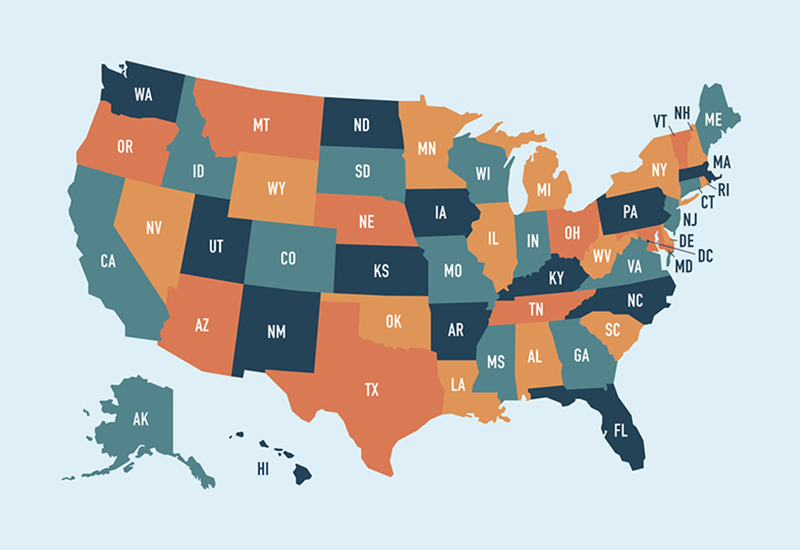Employees in Other States? Here are the Top Tax Implications to Consider
Share post:

Return-to-office plans remain in a state of limbo as some employers find that a remote work strategy is a viable option long term. What are the tax implications for businesses in this new scenario?
Over the past couple of years, businesses have sent employees to work from home as a temporary solution in response to the COVID-19 pandemic. For some employees, that meant working across state lines. For others, it meant making a permanent move out of state, while still being able to work for the same employer. Due to the breakneck speed in which the remote work shift happened, many businesses had little time to prepare, leaving them wondering what their tax and legal obligations are for remote employees working out of state.
If your business employs out-of-state workers, the following outlines what you need to know about state income tax implications for both employers and employees as you navigate the effects of the new remote landscape.
Determining Your Business’ Nexus Footprint
In general, a business is deemed to have a physical presence in the state in which the remote employee resides and may create nexus—exposure to state income tax, sales and use tax, and gross receipts tax filing obligations for the business. It could also trigger city and county tax at the local jurisdiction level. In-state presence applies even if the employee is working from a home office, regardless of whether the employer has a physical office location or other operations in that state.
Nexus and apportionment are two ways to determine what may be owed in each state—and each state is different. Nexus tells us if a business has sufficient presence in a state to produce taxable activities. Apportionment tells us how much of that income generated from those activities is taxable to the state in which the employee resides.
For tax years during the height of the pandemic, several states passed temporary legislation providing safe harbors, which alleviated nexus-generating activity for businesses and allowed businesses to avert additional state income tax obligations. However, once stay-at-home orders were lifted, some states began to rescind those guidelines and safe harbors expired. For example, California’s provision was lifted on June 11, 2021.
Payroll Tax Considerations
For out of state employees, employers will need to withhold state and local income tax from employee wages in accordance with the rules of that state where the employee works. This means it’s important to understand the potentially complex withholding rules in each state remote workers reside. This could include dealing with employees who split time between multiple states and create withholding requirements in multiple states. Some employers may face a new challenge of not knowing where an employee is actually working. Employers need to know where employees are physically working in order to properly comply with state requirements. Beyond taxes, employers will need to keep their human resources team apprised of workers in new states.
Employee Expense Reimbursements
While some employees are updating their work-from-home policies to include certain employee reimbursable expenses, some states require reimbursement of certain employee incurred expenses while working from home. Again, it’s critical to discuss these new state requirements with your HR and employment attorney. The federal tax law allows certain employee expenses to be paid or reimbursed by the employer without creating taxable income for the employees.
In some cases, office equipment, such as computers and monitors, can be provided to remote workers on a tax-free basis. The tax consequences depend on factors such as policies for returning the equipment to the employer if the employee terminates employment or providing written substantiation for reimbursed items.
With regard to phone and internet services, employers may reimburse employees for cell phones as well as the portion of other phone and internet expenses attributable to business use.
Travel expenses are becoming increasing complex due to hybrid work arrangements. Travel between a worker’s residence and the employer’s office may be considered a business expense or a personal expense (commuting) depending on where the workers tax home is. Reimbursement of personal expenses like commuting would be includible in a worker’s taxable compensation. In addition, the Tax Cuts and Jobs Act made certain employer paid commuting expenses nondeductible to the employer even if included in the employee’s taxable income.
Determining a worker’s tax home depends on many factors, such as whether the employee was hired with the expectation he or she would work in the employer’s office on a regular basis and/or if an office/cubicle has been provided for the employee. Shared spaces in a “hoteling” system may qualify the same as dedicated workspace in some situations. Companies and their tax advisers should give consideration to this issue when setting policies for fully remote and hybrid-remote workers.
Conclusion
Due to the fact that the new mobile workforce is here to stay, it’s important that businesses understand how out-of-state employees will expose them to nexus and tax considerations in the states where their remote employees live. Depending on your business’ nexus footprint, tax matters can get complex. Please contact me at jsheffield@bpw.com or (805) 963-7811 if you have any questions about how your business may be impacted.
